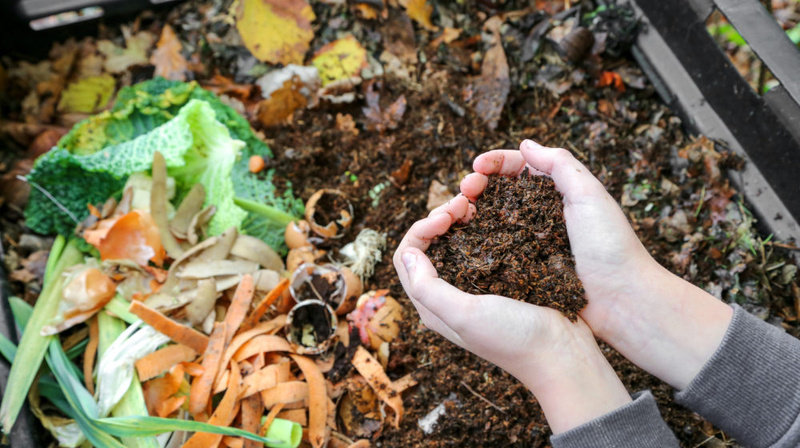
Composting 101
Composting can save household waste from the landfill while creating an organic, nutrient-rich fertilizer and soil amendment to benefit your landscaping. Start composting today: create a compost pile or build a compost bin to save space.
Have you ever stopped to think about the amount of food that ends up in your trash? According to the USDA Economic Research Service, an estimated 133 billion pounds of food is wasted by retailers and consumers in the U.S. each year. Fortunately, composting can curb your food waste and turn it into something sustainable! You can save up to 30% of household waste from the landfill by composting instead.
What Exactly is Compost?
As food waste, leaves, grass, and other organic matter decompose, they create humus. Humus is rich in nutrients, which improves soil and helps keep plants healthy. Composting is the process of these materials decomposing.
What’s the Point of Composting?
Composting helps reduce waste and conserve energy while creating an organic soil amendment or fertilizer to enrich your landscape.
Once compost becomes humus, it can be added to your landscaping. Humus provides nutrients to plants and improves the soil. How? Humus contains microscopic organisms that, when added to the soil, help with aeration and break down additional organic matter beneficial to plants. It also contributes to the soil’s ability to retain water.
What Can I Compost?
Compost needs four things: nitrogen, carbon, oxygen, and water. The materials you add supply nitrogen and carbon.
Dry, brown materials like straw, branches, cardboard, coffee filters, and leaves are carbon-rich. They provide energy for decomposition. Wet, green materials like grass clippings, manure, food scraps, and coffee grounds are nitrogen-rich, reproducing organisms and helping to oxidize the carbon. Your compost should be one-third nitrogen and two-thirds carbon.
Do not compost: bones, meat, diseased plants, perennial weeds, or peels (like banana or orange) that might carry pesticide residue.
Start Your Own Compost
Why wait to start composting? Composting doesn’t require much effort to begin or maintain. Once you get going, your compost pile will do most of the work on its own.
- Gather materials: food scraps, dead leaves, grass clippings, chicken manure, and other organic matter. Make sure to include an ‘activator,’ such as chicken manure or grass clippings, to jumpstart the composting process.
- Clear an area of bare earth.
- Create a base with 3-4 inches of straw or twigs. This will help keep the compost pile drained and aerated.
- Add organic matter to the pile in layers, alternating between moist and dry materials.
- Water the compost pile to moisten (but not soak) it.
- Cover with plastic or wood to help the compost retain moisture and heat and keep it from soaking through.
Voila! You now have a compost pile! Do these three things to maintain the compost:
- Keep it moist with rainwater or by hand watering occasionally, then recover the pile.
- Every few weeks, turn the pile with a pitchfork or shovel. This will aerate the materials and keep the process going.
- Once the compost pile is built, add new materials by folding them in instead of placing them on top.
Space-Efficient Compost Options
Do you live on less than an acre or in a residential area? Don’t let space limitations or worries about odor keep you from composting! A compost bin saves space and keeps compost (and the smell) contained. You can purchase a compost bin or easily make your own using a sturdy garbage can.
- Drill holes in the bottom of the garbage bin to allow for aeration. Space them about 15 centimeters apart.
- Fill the bin with high-nitrogen and high-carbon materials.
- Stir occasionally to ensure all materials receive oxygen and to hasten the composting process.